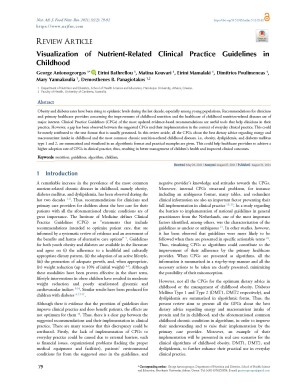Visualization of nutrient-related clinical practice guidelines in childhood
Abstract
Obesity and diabetes rates have been rising to epidemic levels during the last decade, especially among young populations. Recommendations for clinicians and primary healthcare providers concerning the improvement of childhood nutrition and the healthcare of childhood nutrition-related diseases are of major interest. Clinical Practice Guidelines (CPGs) of the most updated evidence-based recommendations are useful tools that help clinicians in their practice. However, a gap has been observed between the suggested CPGs and their implementation in the context of everyday clinical practice. This could be merely attributed to the text format that is usually presented. In this review article, all the CPGs about the best dietary advice regarding energy and macronutrient intake in childhood and the most common chronic nutrition-related childhood diseases, i.e., obesity, dyslipidemia, and diabetes mellitus type 1 and 2, are summarized and visualized in an algorithmic format and practical examples are given. This could help healthcare providers to achieve a higher adoption rate of CPGs in clinical practice, thus, resulting in better management of children’s health and improved clinical outcomes.
Full text article
Authors
Copyright (c) 2021 Authors

This work is licensed under a Creative Commons Attribution 4.0 International License.
-
Attribution — You must give appropriate credit, provide a link to the license, and indicate if changes were made. You may do so in any reasonable manner, but not in any way that suggests the licensor endorses you or your use.
-
No additional restrictions — You may not apply legal terms or technological measures that legally restrict others from doing anything the license permits.





